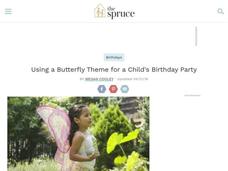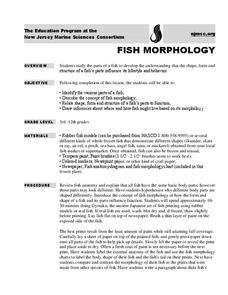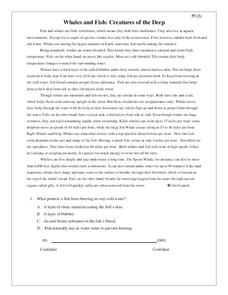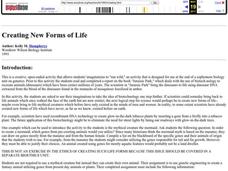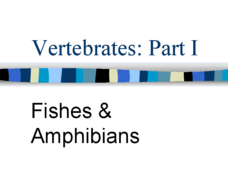Curated OER
Still Life Painting: Arranging Nature
Students choose meaningful objects for a still-life arrangement and paint it using watercolors and write an artist’s statement. In this still life art lesson, students identify and analyze the characteristics of a still-life painting and...
Curated OER
Understanding Folklife and Folklore
Student examine the basic characteristics of folklore. In this folklore lesson, students complete activities to identify two kinds of folk, folk groups, and folklife. Students list daily activities in their home, identify folk groups...
Curated OER
Life Cycle of the Drosophila Fly
Pupils observe the life cycle of the Drosophila fly as well as manipulate large numbers of flies, determine the difference between the sexes, and identify the different stages of the fly's life cycle.
Curated OER
Field Trip - Marine Science Institute
Students discover the ocean life of the San Francisco Bay. In this ocean lesson, students take a Discovery Voyage of the Bay ecosystem through the Marine Science Institute. Also available are inland voyages, ocean labs, and tidepool...
Curated OER
Life Cycles
Using computers, Students work in small groups and progress through the roles of Explorer, Researcher, Designer, and Evaluator as they study the life cycle of plants, insects, butterflies and frogs.
Curated OER
Life Cycle of the Butterfly
Students observe and analyze the life cycle and metamorphosis of the Painted Lady Butterfly. They write observation journal entries three times a week and summarize what they observed. Using KidPix computer software they create pictures...
Curated OER
Life cycles
Students identify and explain the parts of a flower and their role in the life cycle of flowering plants, including pollination, seed dispersal and germination using the Internet. Students will also study and discuss the key points and...
Curated OER
Investigating Ocean Life
Sixth graders explore the various forms of ocean life. They research a creature that lives in the ocean. Students use their research information to create a series of HyperStudio stacks about their sea creature.
Curated OER
Caterpillar to Butterfly
Students draw the life cycle of a butterfly. In this life cycle lesson plan, students read about and discuss the life cycle and then draw what they have learned.
Curated OER
The Ocean
Plant and animal life of the ocean is the focus of this science lesson plan. Young scientists sort a variety of seashells and explore why many sea animals have shells. They examine the shells, write journal entries highlighting the...
Curated OER
Puberty/Adolescence, Day 2: "Who AM I? Where Am I Going?"
A great unit! There is a lot of content that is personal so make sure you have created a safe zone in your classroom before doing this lesson. It will have much more meaning if your learners share their life with others in the class....
Curated OER
once and future MOON
Beyond the phases of the moon, this comprehensive lesson plan covers geologic history and geology. Amateur astronauts examine photos of the lunar landscape, experiment with the creation of craters, and delve into information about the...
Curated OER
Animals Galore
A well-designed lesson plan which covers the characteristics of the animals found in the six animal groups is here for your young biologists. In it, learners divide up into six groups; the amphibians, reptiles, mammals, birds, fish, and...
Consortium for Ocean Science Exploration and Engagement (COSEE)
Fish Morphology
Life comes in all different shapes and sizes, and fish are no exception. Here, young scientists create fish prints as they learn how specific characteristics allow different species to survive in their particular habitats.
National Wildlife Federation
Night Friends - American Bats
Bats are a misunderstood species. Pupils learn about the characteristics of bats in a three-part lesson. They begin by examining the adaptations of different types of bats, then explore the misconceptions humans have about the species....
National Science Teachers Association
Hop into Action
Young scientists find out what makes amphibians such unique and interesting animals in this simple life science lesson. After looking at pictures and discussing the characteristics of amphibians, learners complete a series of three Venn...
Curated OER
Whales and Fish: Creatures of the Deep
Practice comparing and contrasting details in informational text with a reading passage about whales. It explains the ways that fish and whales are similar, as well as the ways they are different, and specific characteristics of various...
Curated OER
The Origin of Life
In this origin of life worksheet, students write answers to five questions. They describe characteristics of the first life forms and how scientists believe oxygen accumulated in the Earth's atmosphere.
Curated OER
Creating New Forms of Life
Although not particularly educational, here is a creative group activity in which high school biologists will use their imaginations to create a new life form combining characteristics from existing life forms. Each group must come up...
Curated OER
Life as a colonial silversmith
Students study the life experiences of people who lived in colonial Boston prior to the American Revolution. They define key terms including Loyalist and Patriot. They write a journal entry as Nathaniel Hurd, a silversmith.
Curated OER
Vertebrates: Part I, Fishes & Amphibians
A simple set of slides shares the three classes of fish and the class amphibia. The first three slides cover fish characteristics and structure, while the last three cover amphibian characteristics and life cycle. Though somewhat...
Curated OER
A Chicken's Life
Here is a set of comprehension questions that go with the story "A Chicken's Life." Learners answer each of nine questions by filling in the blank with the correct word then, they complete ten additional comprehension questions that...
Curated OER
Animals A to Z: Urchin
In this sea urchin worksheet, 3rd graders will add pages to their "animal books." Students will read 10 facts about a sea urchin to gain an understanding of the animal's characteristics.
Curated OER
Animals A to Z: Shark
In this shark instructional activity, 3rd graders will add pages to their "animal books." Students will read 10 facts about a shark to gain an understanding of the animal's characteristics.
Other popular searches
- Characteristics of Life
- 6 Characteristics of Life
- 7 Characteristics of Life
- The Characteristics of Life
- Characteristics of Life Labs
- Characteristics Life
- Life Characteristics Biology
- Basic Characteristics of Life










